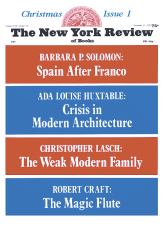To the Editors:
By now the suspicious death of Wladimir Herzog, the thirty-eight-year-old Brazilian TV news chief, journalist, and professor of communications at the University of São Paulo, is a matter of international concern. The full story of how he died remains to be clarified. But all accounts so far agree that three hours after he voluntarily appeared for questioning at the São Paulo headquarters of Brazil’s Second Army, military interrogators pronounced him a suicide and produced a signed confession—over an admittedly illegible signature—to purported membership in the Communist party. The next day, October 26, the Second Army command released Herzog’s corpse in a sealed coffin, barred it to family and public view, and ordered it buried with haste and apparently without benefit of Jewish liturgy.
Less widely known, however, are three related issues bearing on Herzog’s tragic death. Together, they raise the question whether Brazil is about to descend down the ominous path already taken by the Chilean junta.
First, the spontaneous mobilization of justly indignant people in São Paulo stopped one of the potentially most extensive witch hunts in recent memory. Not Brazilian law but the week-long strike of 30,000 university students and professors, the meeting of the Journalists Union in permanent session, and the public celebration of an ecumenical memorial service in the Roman Catholic cathedral of São Paulo produced momentary guarantees for the physical safety of ten other imprisoned journalists. It also called public attention to the fate of eighty-one other political prisoners and extracted from the federal government a pledge to allow a public inquiry into Herzog’s death.
Second, despite the conciliatory policies of Brazil’s president General Ernesto Geisel over the past eighteen months and the restoration of some legal guarantees, hardline military circles, centered chiefly but not exclusively in São Paulo, and allied to foreign and national interests, continue to exert a major role in national affairs. After Herzog’s death, authoritative military sources publicly announced, “an escalation in repression” and an “implacable struggle against the agents of subversive action.” Moreover, the high incidence of journalists who are Jews among those recently arrested may have anti-Semitic implications. At stake in the outcome of the Herzog case, then, is whether the corporativist military faction within the Brazilian armed forces will achieve greater political control or whether efforts for a gradual return to civil liberties are still workable.
Finally, American complicity after the 1964 coup helped set in motion a decade of authoritarian rule, just as official US silence in the face of repeated repression must share the blame for the erosion of human rights. Congress should seriously question the use of tax dollars for regimes which systematically violate human rights; while American scholars, religious leaders, and journalists must see to it that Herzog’s death puts new life into the common struggle for justice and liberty.
Richard Morse, Professor of History, Yale University
Thomas Skidmore, Professor of History, University of Wisconsin, Madison
Alfred Steppan, Associate Professor of Political Science, Yale University
Stanley Stein Professor of History, Princeton University
Charles Wagley, Graduate Research Professor of Anthropology, University of Florida
This Issue
November 27, 1975



